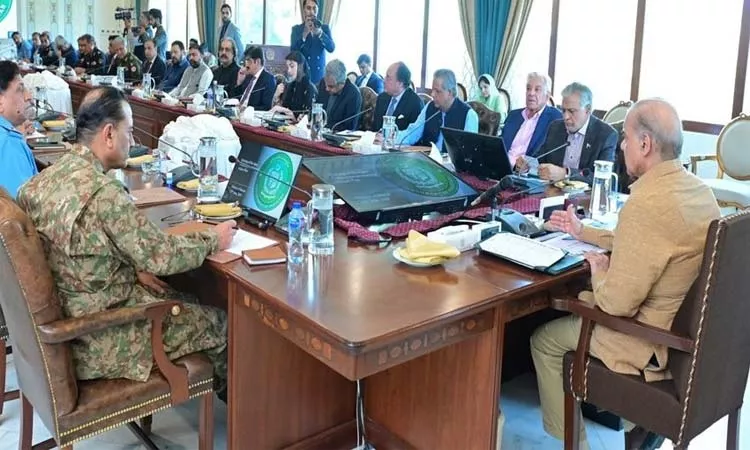Azm-e-Istehkam, which means “resolve for stability”, is a counter-insurgency drive launched by the government of Pakistan last month in the restive Khyber Pakhtunkhwa and Balochistan provinces of the country, triggering widespread protest and condemnation.
Local people from regions of Khyber Pakhtunkhwa province in Pakistan are organising rallies and condemning the operation in the tribal dominated areas. United Kingdom-based Baloch political leader Hyrbyair Marri has strongly criticised the recently launched “counter-terrorism” operation known as Azm-e-Istehkam in the country’s Balochistan and Khyber Pakhtunkhwa provinces.
The Baloch leader, known for his advocacy of Baloch independence, alleged that the military operation was being carried out on the directions of China to protect its economic interests in Pakistan.
“A new military operation is being planned by Pakistan on Chinese orders against the Baloch and Pashtun, known as Azmelstehkaam (Resolve for Stability). That’s Azm-e-Istehkam for China and Punjab, not for the Baloch and Pashtun people,” Hyrbyair Marri posted on X (formerly Twitter).
Marri further criticised the “so-called counter-terrorism” operation as benefiting “Punjabi hegemony” while causing “chaos and death” in Balochistan and Pashtunistan. Expressing concern over the involvement of Pashtuns in the Pakistani armed forces in the operation, the Baloch leader accused them of being used to suppress their own people’s aspirations.
According to local media reports, the Azm-e-Istehkam operation has sparked widespread condemnation from Baloch and Pashtun communities. These communities have historically resisted Islamabad’s authority and expressed grievances over issues, including sovereignty and rights.
The regions where the military operation is reportedly being conducted have seen unrest for years, and incidentally, these regions have been focal points of resistance against Chinese investments under the Chinese communist regime’s China-Pakistan Economic Corridor (CPEC) project.
The operation, which was approved by Pakistan Prime Minister Shehbaz Sharif, aims to eradicate extremism and terrorism in a “comprehensive and decisive manner”. Pakistani government officials claimed the operation will not only include military action, but socio-economic uplift to deter extremism.
The ambassador of Pakistan to the United States has urged the US to provide small arms and modern equipment to the South Asian nation to ensure the success of the newly approved counter-terrorism initiative, reports said.
According to a report by The Diplomat, the Azm-e-Istehkam campaign, which is a plan of Pakistan’s National Action Plan adopted in the aftermath of the December 2014 Peshawar terror attack at the Army Public School that claimed over 140 lives, mostly children, is loud on rhetoric, low on substance and offers nothing substantive to stem the rising tide of militancy in the South Asian nation.
In its report, The Diplomat said that the counter-terrorism operation has two key components — kinetic and diplomatic.
Operational efforts will aim to dismantle terrorist networks under the kinetic component of Azm-e-Istehkam operation, while the diplomatic component will focus on building pressure on the Taliban regime to stop harboring Tehreek-e-Taliban Pakistan (TTP) as well as evolve a regional approach, as reported by The Diplomat.
Firstpost, in its report, indicated a Chinese influence behind the counter-terrorism operation as the announcement of Azm-e-Istehkam came a day after Liu Jianchao, the head of the International Department of China’s ruling Communist party, and a close aide of President Xi Jinping, voiced grave concerns at a political forum.
Pakistan’s leading English daily Dawn reported that the high-ranking Chinese official starkly highlighted that the deteriorating security situation in Pakistan undermined the confidence of Chinese investors, urging a ramp-up in security measures. A reiteration of such remarks at all diplomatic levels signals Beijing is pressuring Islamabad for something that has been a difficult call for any establishment in the South Asian country, reported Firstpost.
Al Jazeera reported, quoting Asfandyar Mir, a South Asia expert at the United States Institute of Peace (USIP), that the timing of the latest counter-terrorism operation announced by Pakistan was potentially driven more by domestic policies and economic considerations, while Chinese concerns likely influenced the Pakistani leadership.
The Doha-based media outlet, in its report, also questioned the fate and outcome of the counter-terrorism initiative as Pakistan had announced a military operation earlier in April last year, during Sharif’s previous tenure as Prime Minister, but an official military campaign never commenced. In its report, The Diplomat also said that the fate of operation Azm-e-Istehkam is not going to be any different from the previous military operations.
dailyasianage.com

